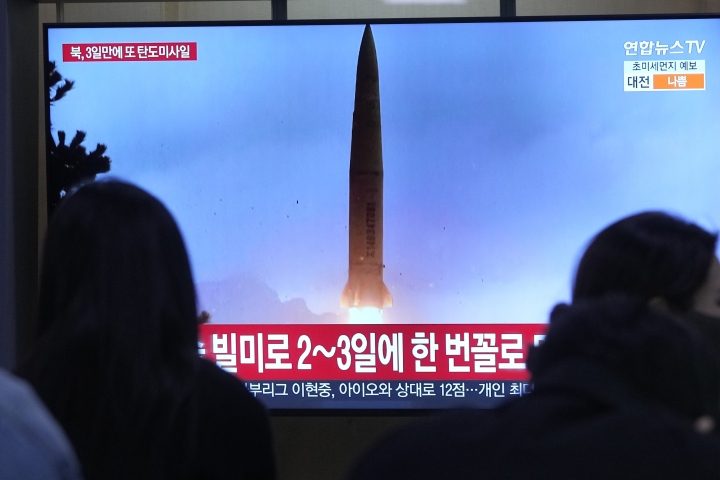
North Korea will step up its nuclear deterrent to guarantee its security against a potential U.S. nuclear strike, its state media reported on November 3 as it slammed the United States for a recent intercontinental ballistic missile (ICBM) test.
On November 1, the U.S. Air Force launched a nuclear-capable Minuteman III missile from the Vandenberg Space Force Base in California, before blowing the missile up after detecting an anomaly. South Korean defense officials participated in the test in their first such visit since 2016.
A North Korean military commentator said that, notwithstanding the failure of the U.S. test, the presence of South Korean “puppet military gangsters” revealed that U.S. nuclear weapons were aimed at North Korea.
“The DPRK [the Democratic People’s Republic of Korea, North Korea’s official name] will as ever continue its military action to bolster up the deterrence and ensure the strategic security in the Korean peninsula and the region,” the unidentified commentator declared in a report carried by the state-controlled KCNA news agency.
The commentary also blasted the United States and South Korea for recent military activities, including the mobilization of U.S. nuclear strategic bombers to South Korea.
“The nuclear threat by the US and its vassal forces to the DPRK nears a new red line,” the North Korean commentator warned, calling for the strengthening of “self-defensive nuclear armed forces.”
South Korea’s Unification Ministry, which handles inter-Korean affairs, said that North Korea’s remarks raised the issue of whether North Korea was trying to justify another military “provocation.”
“It is clear that the current heightened tensions on the Korean peninsula resulted from North Korea’s futile nuclear development and reckless military provocations,” deputy ministry spokesperson Kim In-ae declared at a briefing.
In October, South Korea conducted a joint exercise with the United States and Japan near the Korean peninsula, entailing a U.S. B-52 strategic bomber and fighter jets of all three countries.
Additionally, the United States and South Korea conducted air exercises involving 130 warplanes from both countries to simulate 24-hour wartime operations last month.
South Korea and the United States claim their exercises were meant to maintain combat readiness to respond to North Korea. In turn, North Korea condemned the exercises as attempts by the United States and its South Korean ally to invade it.
On November 3, North Korea also verified that it was closing down some embassies in an attempt to “rearrange its diplomatic capacity efficiently,” closures that South Korea claims disclose that the North is grappling with the impact of sanctions.
North Korea is scheduled to close as many as a dozen embassies, including ones in Spain, Hong Kong, and various countries in Africa, according to media reports and analysts, which could mean the shutdown of almost 25 percent of its global missions.
A North Korean Foreign Ministry spokesperson confirmed on the ministry website that some missions were closing, while elaborating that new ones were opening.
“We are carrying out operations to withdraw and establish diplomatic missions in accordance with changing global environments and national foreign policy,” the spokesperson said, labeling such closures as normal activity without further elaboration.
Despite facing widespread sanctions over its missile and nuclear programs, North Korea still keeps business and diplomatic ties with a falling number of Cold War-era friends.
International sanctions monitors have accused North Korean missions of participating in illicit activities to raise cash for their operations and send it back to Pyongyang.
Meanwhile, South Korea is seeking assistance from five domestic banks to help finance Poland’s purchase of $22 billion worth of arms after Warsaw hit import-export lending limits, per a report by Reuters on November 3.
“Five local banks are reviewing a syndicated loan as a support measure” intended to assist Warsaw’s purchase of military hardware from Seoul, Reuters said. This includes rocket artillery systems and fighter jets, the news agency elaborated, citing a South Korean government official who spoke on condition of anonymity.
Officials from a South Korean defense manufacturer verified talks of a syndicated loan plan, Reuters reported, while two representatives of South Korean banks confirmed that loans would be issued, without providing further details.
A syndicated loan entails a group of lenders cooperating to offer a huge sum to a single borrower, usually to fund substantial deals. The South Korean defense official told Reuters that, should the syndicated loan be inadequate, “there could be other financing measures on the way.”
If Seoul is successful working around Poland’s financing obstacles, it would secure South Korea’s largest-ever arms sale, worth around $22.7 billion. It follows a deal struck between the countries last year through which South Korean arms manufacturers arranged the supply of tanks, howitzers, and fighter jets to the EU state.
That arrangement was worth about $13.7 billion, and was South Korea’s largest arms export deal at that time. Government officials in Seoul did not comment on the latest reported transaction when questioned by Reuters.
The Russia-Ukraine military conflict has bolstered South Korea’s weapons-exporting industry, with sales totaling around $17 billion last year — a major rise from the $7.25 billion it registered in 2021. Seoul’s 2022 deal with Poland positioned it as a key player in a global weapons-export market traditionally led by the United States and Russia.
Reuters pointed out that South Korean leadership was looking to boost ties with Europe, and particularly with Poland, which borders Ukraine, as Warsaw reinforces its military stockpiles.
In September, Polish Prime Minister Mateusz Morawiecki suggested that Poland would no longer supply arms to Ukraine amid a dispute regarding Ukrainian grain exports. Rather, Morawiecki outlined a plan for Warsaw to overhaul its own military hardware.
However, Morawiecki subsequently clarified his comments, which he said had been misunderstood in the “worst possible way,” by saying that it would be only newly bought arms that would not be sent to Ukraine amid its conflict with Moscow.



